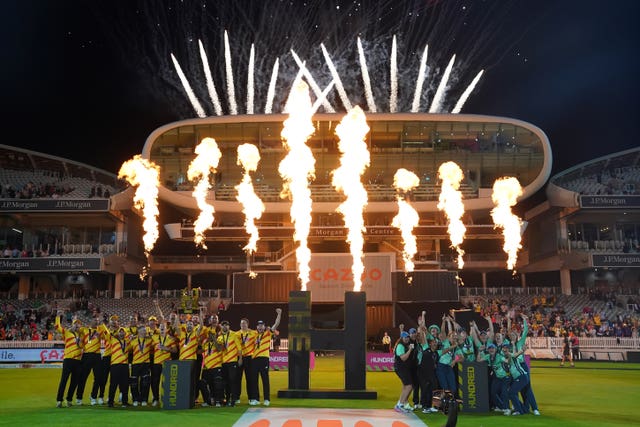
Richard Gould, the chief executive of the England and Wales Cricket Board, has insisted making changes to the format of The Hundred is “not something that’s on my agenda”.
The peak summer month of August has been controversially ring-fenced for the third season of The Hundred, which still polarises opinion among cricket fans and is exclusively played in the UK.
Reports last month suggested its structure was being considered and the theory gained traction with the news Sanjay Patel, mastermind and managing director of The Hundred, would leave the ECB in September.

But Gould argued the distinction between the 100-ball competition and its T20 rivals abroad is a selling point and admitted Sky and the BBC, the ECB’s broadcast partners, are champions of The Hundred.
“In a crowded market, it is a point of difference,” Gould said on the Final Word podcast. “The format is not something that’s on my agenda, in this regard.
“Sky have been really supportive in driving it forward, it’s given us that point of difference and everyone in the cricketing world has heard of The Hundred, that’s a good thing.
“As long as people are talking about the game, I’m happy.
“There is always going to be arguments with competition, as to what we do and where we go next but we will be utterly pragmatic and more focused on progressive improvement and we will do it in a collaborative manner where everybody can feel involved.”
"We are not going to take the Hundred out. We are going to make it bigger and better."
Listen to our exclusive interview with ECB CEO Richard Gould. Full links below.
🍎https://t.co/AEqKRACc96🟢https://t.co/BQ5F52aM5G pic.twitter.com/3tB8fVPC5Q
— The Final Word (@Final_Word_Pod) June 1, 2023
According to a report from Worcestershire chair Fanos Hira, the competition made a £9million loss in its first two seasons, a figure disputed by the ECB which says a profit of £11.8m was achieved.
Gould and ECB chair Richard Thompson were once prominent critics when The Hundred was first broached during their stints in identical roles at Surrey but the pair’s stance has softened appreciably.
But while Gould sees substantial upsides to The Hundred, he believes there is room for improvement amid a proliferation of domestic white-ball competitions from all over the world fighting for attention.
“You see the competition we’re in globally now and every country needs to have a super primetime white-ball domestic competition,” Gould said.
“We have invested very heavily in The Hundred over a number of years, both emotionally and financially.
“We are not going to take The Hundred out, we are going to make it bigger and better. We’re going to make the whole of cricket bigger and better, that is our aim.
“I think the level of investment that has gone into The Hundred has delivered really good returns in terms of a new audience. The broadcasters really enjoy it, the BBC have put it on free-to-air.”
Gould, who has already opened the door for multi-year central contracts and increased match fees for England players, accepted salaries in The Hundred may need to go up to compete with its market rivals.
See you all in 100 days! 😍👋#TheHundred pic.twitter.com/PY2noOrIr0
— The Hundred (@thehundred) April 23, 2023
Currently, the highest bracket for the men in The Hundred is £125,000 while for women it is £31,250.
“Salaries will need to go up, not just for The Hundred but also for international cricket because we can see there is a global market for players,” Gould added.
“The difficulty for the ECB and our revenues is we have so many mouths to feed whereas the franchise tournaments can just take the cream off the top, they don’t get charged for the players, they’re very efficient models at getting money back into the players’ pockets but they’re not funding the pathway.
“We’re always going to fund the pathway but having a really strong and healthy pathway is the secret to long-term success, you’ve got to have the players.”


Comments: Our rules
We want our comments to be a lively and valuable part of our community - a place where readers can debate and engage with the most important local issues. The ability to comment on our stories is a privilege, not a right, however, and that privilege may be withdrawn if it is abused or misused.
Please report any comments that break our rules.
Read the rules here